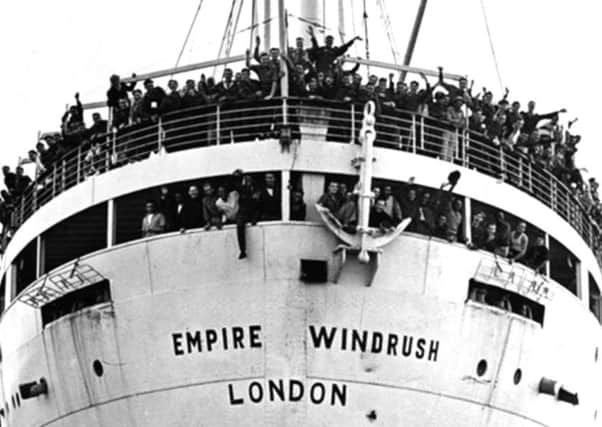Andrew Vine: Windrush '“ and how Britain was changed on day the future docked


So it was with the 492 Caribbean immigrants who sailed into Britain aboard the Empire Windrush, 70 years ago on Thursday. They could not have known it, nor even dreamed it, but were destined to change the face of British society.
The anniversary is a significant event in itself, but what it represents still has tremendous resonance today.
Advertisement
Hide AdAdvertisement
Hide AdOur society simply wouldn’t function or hold the views it does if it were not for the trail blazed by those men who disembarked at Tilbury. And the debate they prompted about immigration is uncannily like that we still hear on an almost weekly basis.
“Sons of Empire” they were branded by one newspaper of the time, but if had instead called them “Emissaries of the Future”, it wouldn’t have been far wrong.
The multicultural, diverse, tolerant Britain we take for granted now had its beginnings then, and in the backdrop against which the immigrants arrived, as Empire evolved into Commonwealth.
Those first arrivals – many housed temporarily in a former air raid shelter – and those who followed were to become victims of racism. Happily, most lived long enough to see their new country grow out of such appalling bigotry.
Advertisement
Hide AdAdvertisement
Hide AdThat summer of 1948 has other resonances for us today. A little over a fortnight after Windrush docked, the NHS was born, taking its place at the heart of national life, just as it remains now. And then as now, immigrant workers were essential to its functioning.
For all the war-weary, food-rationed, smog-shrouded Britain of 70 years ago might appear to be a different country, some things are remarkably similar.
The passengers from the Caribbean had hardly disembarked before the Prime Minister, Clement Attlee, received an angry letter from a group of his own MPs fuming about immigration.
That scenario might well prompt a weary nod of recognition from Theresa May, as she is battered this way and that over the same issue by elements of her own party amid the morass of Brexit negotiations.
Advertisement
Hide AdAdvertisement
Hide AdIt was a strange coincidence that even before the anniversary arrives, the name of the ship, and all it represented, should have resurfaced in the public consciousness thanks to the terrible –and shameful – mess that the Government made over citizenship rights for people from the Commonwealth.
The furore that blew up in April, ultimately claiming the scalp of Home Secretary Amber Rudd who resigned over the issue, also told us much about how Britain’s outlook had been influenced by those first pioneering arrivals.
The sense of outrage at the sheer unfairness of how people who had every right to live in Britain had been arbitrarily condemned as illegal aliens by faceless officialdom spanned the entire political spectrum, and every age and social group.
That was a measure of how completely Britain had changed, embracing those who had followed in the footsteps of the first arrivals in what must have seemed a strange, and sometimes hostile, land.
Advertisement
Hide AdAdvertisement
Hide AdEven a couple of generations ago, when it was still commonplace for television comedies to derive laughs from crude racial stereotypes, such a reaction of anger – and even revulsion – at what had been done to hard-working people would have been neither so widespread nor so heartfelt.
But the closest parallel between the anniversary and our own times lies in the reason why the Windrush passengers embarked for Britain – shortage of labour. Then, as now, the government of the day knew that the country could not meet all its requirements for workers from within the population. The landscape that stretched inland from Tilbury was ravaged by bombing, and a major rebuilding programme lay ahead.
Today, it’s not about reconstruction, but doing what is necessary to keep the economy ticking over and maintaining services, especially the one that is closer than any other to the country’s hearts.
But the decisions taken by governments separated by seven decades are striking in their parallels. Attlee’s took the decision to throw open the country’s doors to citizens of what was then the Empire as a matter of pragmatism.
Advertisement
Hide AdAdvertisement
Hide AdAnd May’s administration, only last week, showed a similar pragmatism in abandoning artificial caps on the numbers of doctors and nurses from outside the EU being allowed in to work for the NHS, a move that paves the way for similar relaxations of restrictions on other skilled workers from abroad.
The Britain where Windrush docked was a country in flux, casting an anxious backward glance at old certainties fading away as it moved into an uncertain future.
So is the Britain where new doctors and nurses will arrive. Then, it was the loss of Empire and an unpredictable post-war world. Now, it is life after Brexit, which is equally hard to foretell.
Seventy years on from a pivotal moment that helped to shape our country for the better, some things haven’t changed at all.